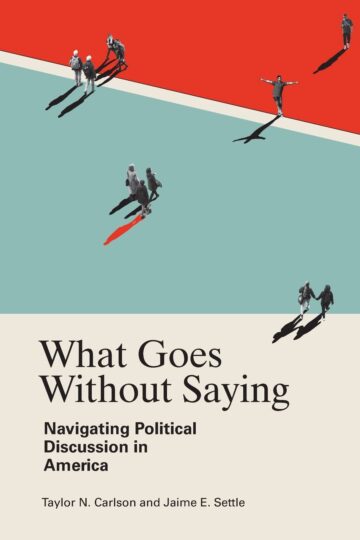Why are political conversations uncomfortable for so many people? The current literature focuses on the structure of people’s discussion networks and the frequency with which they talk about politics, but not the dynamics of the conversations themselves.
In “What Goes Without Saying,” Taylor N. Carlson and Jaime E. Settle investigate how Americans navigate these discussions in their daily lives, with particular attention to the decision-making process around when and how to broach politics. The authors use a multi-methods approach to unpack what they call the 4D Framework of political conversation: identifying the ways that people detect others’ views, decide whether to talk, discuss their opinions honestly—or not, and determine whether they will repeat the experience in the future.
In developing a framework for studying and explaining political discussion as a social process, “What Goes Without Saying” will set the agenda for research in political science, psychology, communication, and sociology for decades to come
Reviews
‘The nature of democratic discourse is one of the most studied topics in the social sciences – and for good reason since it plays a large role in determining how democracies function. Yet, existing work has almost completely ignored the fundamental question of why people talk about politics in the first place. The authors make a seminal contribution by detailing the processes that drive political discussions or lack thereof. Their framework, which accentuates how social processes shape political interactions, will guide thinking for generations to come.’
James N. Druckman – Payson S. Wild Professor of Political Science and Faculty Fellow at the Institute for Policy Research, Northwestern University
‘Carlson and Settle bring together several strands of research that have been percolating over the past decade or so; then, they advance our state of understanding by bringing these strands into conversation with one another. With their 4D Framework, a more coherent and ultimately useful perspective on informal political discussion has emerged. These insights highlight new questions and directions for research and raise a cautionary note about broad and undifferentiated calls for more talk as a salve for American democracy.’
William P. ‘Chip’ Eveland Jr. – Professor of Communication, The Ohio State University
About the author
Taylor Carlson is associate professor of political science in Arts & Sciences at Washington University in St. Louis. She is also director of survey research in the Weidenbaum Center in Arts & Sciences. Her research explores the intersection of information consumption and social interactions about politics, as well as the content, process, and consequences of interpersonal political communication.
